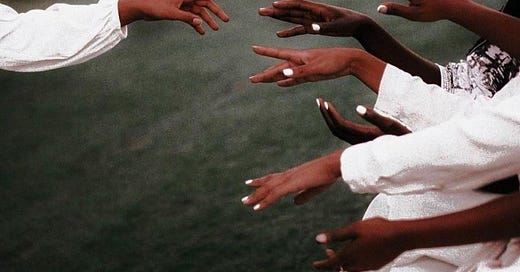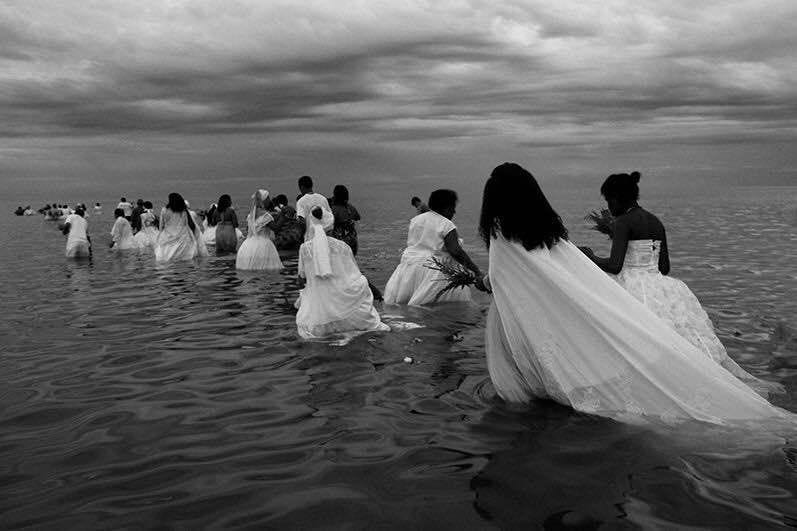Good Friday was never holy to begin with.
At least not in the way they taught us. Not some quiet day of solemn reverence. Not some ordained passage toward glory. No, Good Friday has always been a public lynching, an execution masked as ritual, a state-sponsored killing passed down through scripture and sanitized by stained glass. They teach us it was necessary, but they never tell us who made it so. They say he died for us, but I have come to believe that Jesus died because the state cannot stomach what it cannot control. Because empire always kills those who dare to love too loudly, too tenderly, too freely.
And what is Good Friday if not a mirror? What is the crucifix but a state’s warning disguised as salvation?
Every year we return to this day, and every year the question lingers in the air like smoke: Who is being crucified now?
The answer comes too quickly. The names multiply too easily. Gaza. Atlanta. Ferguson. Juárez. Congo. Sudan. Gaza again. Gaza still.
This year, the palms feel heavier in our hands, not as celebration, but as funeral fans. Not as praise, but as protest. We are not cheering for a king on a donkey. We are marching in the streets. We are crying for trans babies being legislated out of existence. We are mourning book bans, gun violence, and burnt-down dreams. We are choking on smoke and scripture. And still they tell us this day is “good.”
But Judas didn’t act alone.
That’s the lie of tradition. That one man handed Jesus over for silver. But the betrayal was bigger than a kiss. The betrayal was systemic. A collaboration of church and state. A partnership between the pulpit and the prison. Judas had a badge. Pilate had a press release. The soldiers had immunity. The crowd had been conditioned to scream “crucify him” not because they were evil, but because they were exhausted and misled. Because the empire always offers us someone to blame for our oppression, someone who looks like us, someone who dares to be freer than we have been allowed to imagine.
And still, they hung him. But not the Jesus they told us about. No.
Let me tell you about my Jesus. Let me tell you about the one I’ve come to know.
This Jesus is nonbinary. This Jesus is brown and barefoot. They are undocumented, unarmed, unhoused, and deeply unbothered by the decorum of respectability. They weep in public and call it prayer. They kiss their friends on the cheek and call it communion. They walk into temples and flip over capitalism like it’s furniture. They touch the untouchable. Heal the unclean. Love the unloved. And do it all with a softness that makes the powerful tremble.
This Jesus is loud in their love. Queer in their embodiment. Familiar with hunger, betrayal, and handcuffs. They are not safe. And if they walked into most churches today, they would be escorted out before the opening hymn.
This Jesus would be crucified again.
And yet this is the Jesus I believe in. Because this Jesus doesn’t just save us. They see us. They are us.
Which brings me back to this Friday. Not yet Sunday. Not yet free.
The hardest part of faith is the in-between. Between crucifixion and resurrection. Between despair and deliverance. Between the last breath and the first light of morning. It is where so many of us live; between the grief and the growing. Between the prayer and the protest. Between the headlines and the hashtags.
I think about Breonna. About all the times we buried our own before sundown. About the speed at which Black death is cleaned up and forgotten. I think about the mothers who keep vigil in courtrooms and community centers. About the children who grow up knowing how to duck before they know how to read. About the queer teens who see the news and wonder if there’s a future for someone like them.
This Friday, we are not caught between cosmic obligation and existential terror. We are living inside both. But we are not lost.
Because hope, real hope is not sanitized. It’s not neat or tidy or easy. Hope is what you hold onto while bleeding. Hope is the scream that still rises from the chest even when you know no one is coming. Hope is knowing the tomb is real, and refusing to stay in it.
Resurrection doesn’t erase the cross. It reclaims it.
And so we gather not in fear, but in fire. Not in shame, but in song.
Because even with wounds still open, we know that liberation is coming. Not in the form of a white-robed savior floating down from the clouds, but in the form of community, protest, healing, poetry, chosen family, reimagined scripture, and righteous rage. We know it in our bones and in our breath. We know it when we hold each other and refuse to look away. We know it when we remember that our ancestors did not survive the Middle Passage, Jim Crow, the AIDS crisis, mass incarceration, police bullets, or stolen lands for us to forget who we are.
So this Good Friday, I do not mourn a distant God. I mourn with Them—the nonbinary Christ who still bleeds beside us. I witness their wounds and offer my own. I carry the cross not as burden, but as memory. As mirror. As map.
And when Sunday comes, it will not be proof that we’ve been delivered from pain.
It will be proof that we’ve survived it.






Thanks for another engaging piece. I’ve been doing some forgiveness work on my relationship with Christianity. As I mentioned to you, your writing reminds me of the sermons I used to preach. When I read your work, it calls up both grief and wonder. This piece was born out of that tension. Would you ever consider doing a live video together? https://open.substack.com/pub/pedrosenhorinhasilva/p/grieving-my-religion-part-1
THIS!!!!!! “The hardest part of faith is the in between….” That small statement was so big and everything! Thank you for this piece. I’m a preacher, and was moved! I love this! Thank you.